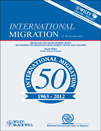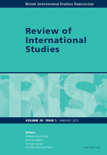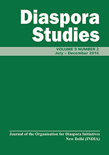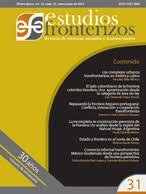
INTERNATIONAL MIGRATION
Scope & Guideline
Exploring the Dynamics of Global Movement
Introduction
Aims and Scopes
- Multidisciplinary Approaches to Migration Studies:
The journal promotes a multidisciplinary perspective, integrating insights from sociology, political science, economics, and anthropology to analyze migration dynamics. - Focus on Migrant Experiences and Agency:
Research published in the journal highlights the lived experiences of migrants, emphasizing their agency, resilience, and the social networks they navigate in host countries. - Impact of Policy and Governance on Migration:
The journal critically examines the role of national and international policies in shaping migration patterns, including the implications of immigration laws, border control, and humanitarian responses. - Intersectionality in Migration Research:
A significant focus is placed on how various identities (such as gender, race, and class) intersect to affect migrants' experiences, highlighting issues of inequality and discrimination. - Transnationalism and Global Mobility:
The journal explores transnational ties and the implications of global mobility, including the economic, social, and cultural exchanges that occur across borders. - Response to Current Events and Crises:
Papers often address the impact of global crises (e.g., pandemics, wars, climate change) on migration patterns, experiences, and policies, providing timely insights into contemporary challenges.
Trending and Emerging
- COVID-19 and Migration Dynamics:
Research examining the effects of the COVID-19 pandemic on migration patterns, experiences, and policies has surged, highlighting the intersection of health crises and migratory movements. - Mental Health and Well-being of Migrants:
A growing body of literature focuses on the mental health challenges faced by migrants, considering the impact of displacement, trauma, and social isolation. - Environmental Migration and Climate Change:
There is an increasing focus on the relationship between environmental changes and migration, exploring how climate-related factors drive displacement and shape migration policies. - Digital Migration and Technology:
Emerging research investigates the role of digital technologies in migration processes, including how social media and digital platforms influence migration decisions and experiences. - Intersectionality in Migration Studies:
There is a rising interest in intersectionality, with studies exploring how multiple identities (e.g., gender, race, sexual orientation) intersect to shape migration experiences and responses. - Transnational Family Dynamics:
Research on the implications of transnational family structures, including the challenges and benefits of maintaining family ties across borders, is gaining traction.
Declining or Waning
- Traditional Economic Migration Studies:
Research focusing strictly on economic migration without considering broader social and cultural contexts appears to be declining, as scholars increasingly recognize the importance of integrated approaches. - Homogeneous National Policies:
Studies that treat migration policies as uniform across nations are becoming less common, with a growing emphasis on comparative analyses that highlight the nuances and variations in migration governance. - Static Models of Integration:
The use of static or one-dimensional models to analyze migrant integration has waned, giving way to more dynamic and complex frameworks that consider the fluidity of migrant identities and experiences. - Nationalistic Perspectives on Migration:
Research that promotes unilateral nationalistic viewpoints on migration and overlooks the transnational and global implications of migration is seeing a decline, as the discourse shifts towards more inclusive and global perspectives. - Focus on Refugee Crisis as a Singular Event:
The framing of refugee crises as isolated incidents is diminishing, as scholars now emphasize the ongoing nature of displacement and the need for continuous engagement with refugee issues.
Similar Journals

REVIEW OF INTERNATIONAL STUDIES
Fostering critical analysis of global affairs.REVIEW OF INTERNATIONAL STUDIES, published by Cambridge University Press, is a leading journal in the fields of Political Science and International Relations, with a robust focus on sociopolitical dynamics from a global perspective. Established in 1976, it has garnered a distinguished reputation, achieving a Q1 ranking in both Political Science and Sociology for 2023, underscoring its impact and relevance within the scholarly community. With an impressive Scopus ranking placing it in the 93rd percentile among peer journals in its field, this journal serves as an essential platform for researchers, professionals, and students engaged in critical analysis and discourse on international affairs. Although it does not currently offer Open Access options, the journal is committed to advancing knowledge through rigorous peer-reviewed research, contributing significantly to the academic dialogue surrounding global political issues.

Diaspora Studies
Unpacking the Complexities of Diaspora CommunitiesDiaspora Studies is a leading journal published by BRILL, focusing on the multifaceted dimensions of diaspora communities across the globe. With an ISSN of 0973-9572 and an E-ISSN of 0976-3457, this journal serves as a vital platform for researchers, professionals, and students interested in the intricate interrelations of demography, history, political science, and geography as they pertain to diasporic populations. Currently, it boasts a commendable impact factor and is ranked in the Q2 category for Demography, Q3 for Geography, Planning and Development, Q1 for History, and Q2 for Political Science and International Relations, indicating its respected position in these fields. Although the journal does not offer Open Access options, it remains committed to disseminating high-quality, peer-reviewed research that enhances understanding of the dynamics of migration and transnational identity. The journal, underpinned by years of academic contribution since its inception in 2009 and with coverage extending through 2024, continues to attract scholarly attention, underpinning its significance in advancing the field of diaspora studies.

Estudios Fronterizos
Exploring the Complexities of Borders and BeyondEstudios Fronterizos is a prestigious academic journal published by the Universidad Autónoma de Baja California, renowned for its contributions to interdisciplinary studies concerning border issues, with a focus on the social sciences, including Anthropology, History, Demography, and Political Science. Since its inception in 1983, this Open Access journal has fostered academic dialogue by providing an accessible platform for researchers, professionals, and students to share their findings and insights. With its impressive impact factor and recognition as a Q1 and Q2 journal across various disciplines as of 2023, Estudios Fronterizos not only serves as a crucial resource for contemporary research on border dynamics but also stands out in comparisons to its peers—ranked within the top percentiles in several categories such as Arts and Humanities, Social Sciences, and Demography according to Scopus. The journal's expanding scope and commitment to academic rigor ensure its role as a foundational resource for those seeking to understand the complexities of border studies in a globalized world.

International Journal of Asia Pacific Studies
Exploring the Rich Tapestry of Asia Pacific ScholarshipInternational Journal of Asia Pacific Studies, published by PENERBIT UNIVERSITI SAINS MALAYSIA, is a distinguished academic journal dedicated to advancing scholarly dialogue in the fields of cultural studies, sociology, and political science, particularly within the Asia Pacific region. With an impact factor reflecting its relevance, this open access journal has been freely available since 2005, ensuring wide accessibility for researchers, academics, and students alike. The journal currently holds an impressive ranking of Q2 in Cultural Studies and Q3 in Sociology and Political Science, reflecting its commitment to high-quality publications. Featuring rigorous peer-reviewed research, International Journal of Asia Pacific Studies not only presents cutting-edge insights but also serves as a platform for multidisciplinary exchanges, fostering a deeper understanding of the complex socio-political dynamics in the Asia Pacific. The journal operates from Malaysia and welcomes contributions that illuminate issues and trends shaping the region's cultural landscape, solidifying its role as an indispensable resource for the academic community.

Novedades en Poblacion
Connecting Research and Policy for Vibrant CommunitiesNovedades en Poblacion is a pivotal academic journal dedicated to the interdisciplinary exploration of demographic studies, population policies, and social dynamics, published by UNIV HABANA. Since its inception in 2005, this open access journal has provided a platform for researchers, professionals, and students to disseminate and discuss cutting-edge research and findings relevant to populations in Latin America and beyond. With a commitment to high-quality scholarship, Novedades en Poblacion plays a vital role in contributing to the global conversation on demographic changes, migration patterns, and socio-economic impacts on populations. Researchers are encouraged to submit original articles, reviews, and studies that advance the understanding of demographic issues, making it an essential resource for those engaged in the fields of sociology, public health, and urban studies.

Papers-Revista de Sociologia
Exploring the dynamics of society and politics.Papers-Revista de Sociologia is a distinguished academic journal published by the Universitat Autònoma de Barcelona, dedicated to advancing the field of sociology and political science. Since its establishment in 1973, this open access journal has been a vital platform for researchers and scholars, providing a wide array of peer-reviewed articles that contribute to the understanding of social dynamics. With an ISSN of 0210-2862 and an E-ISSN of 2013-9004, the journal is accessible worldwide, promoting free dissemination of knowledge in the social sciences. Papers-Revista de Sociologia currently holds a Q3 ranking in both Social Sciences (miscellaneous) and Sociology and Political Science categories for 2023, reflecting its competitive standing in the academic community. Its Scopus ranking further underscores its relevance, positioned within the 53rd percentile. The journal’s commitment to scholarly excellence establishes it as an essential resource for researchers, professionals, and students eager to engage with contemporary sociological issues and political analyses.

Si Somos Americanos-Revista de Estudios Transfronterizos
Unveiling the Complexities of Transborder IdentitiesSi Somos Americanos - Revista de Estudios Transfronterizos, published by UNIV ARTURO PRAT, is a distinguished open-access journal that has been serving the academic community since 2012. Based in Chile, this journal provides a platform for groundbreaking research in the fields of Cultural Studies, History, and Social Sciences, achieving remarkable rankings with a Q1 classification in both Cultural Studies and History as of 2023. Its contributions have garnered a notable presence, sitting in the 86th percentile in Arts and Humanities and maintaining strong engagement within its field. Spanning a converged period from 2019 to 2024, the journal aims to foster interdisciplinary dialogue that challenges traditional boundaries and promotes understanding of transborder issues. The journal's commitment to open access ensures that its research is readily accessible, allowing for greater dissemination of knowledge among students, researchers, and professionals alike. With an ISSN of 0718-2910 and an E-ISSN of 0719-0948, Si Somos Americanos stands as a crucial resource for anyone invested in the dynamics of cultural and historical studies in a transnational context.

Migraciones
Fostering Interdisciplinary Dialogue on Migration IssuesMigraciones, an esteemed academic journal founded in 2012 and published by the UNIV PONTIFICIA COMILLAS MADRID, FAC FILOSOFIA, serves as a vital resource in the fields of Cultural Studies and Demography. With a commendable Q1 ranking in Cultural Studies and a strong presence in Demography (Q2), this journal boasts a significant impact in facilitating scholarly discourse and empirical research in migration issues. The journal has embraced an Open Access model since 2016, providing unrestricted access to its rich array of scholarly articles that critically examine the cultural implications and demographic dynamics of migration patterns globally. Migraciones not only showcases rigorous peer-reviewed research but also encourages interdisciplinary studies, making it an essential publication for researchers, professionals, and students seeking to deepen their understanding of migratory phenomena. For those interested, the journal is accessible under ISSN 1138-5774 and E-ISSN 2341-0833, based in Madrid, Spain.

Revista Internacional de Estudios Migratorios
Unlocking Insights into the Complexities of MigrationRevista Internacional de Estudios Migratorios, published by Universidad de Almería, is a pioneering open-access journal that has been at the forefront of migration studies since its inception in 2010. With its ISSN 2173-1950, this distinguished journal provides a vital platform for researchers, academics, and practitioners to share innovative ideas and findings on migration trends, policies, and societal impacts. By fostering interdisciplinary dialogue, the journal aims to contribute significantly to the understanding of migration dynamics in a globalized world. As an open-access publication, it ensures that high-quality research is freely available to a broad audience, enhancing accessibility and engagement within the scholarly community. With its commitment to advancing knowledge and policy relevance in the field of migration studies, the revista Internacional de Estudios Migratorios represents an essential resource for anyone interested in addressing the challenges and opportunities presented by contemporary migration issues.

Journal of Chinese Overseas
Advancing Interdisciplinary Insights on Chinese Communities WorldwideThe Journal of Chinese Overseas, published by BRILL, is a distinguished academic journal dedicated to the exploration of the Chinese diaspora and its impact on global cultural dynamics. With an ISSN of 1793-0391 and an E-ISSN of 1793-2548, this journal delivers rigorous interdisciplinary research that spans across disciplines such as Anthropology, Cultural Studies, History, and Sociology, achieving notable category quartiles in 2023, including Q1 in History and Q2 in both Anthropology and Cultural Studies. The journal, which has been converging valuable insights since 2007 and is set to continue until 2024, serves as an essential platform for scholars, offering thought-provoking analyses and fostering discussions that illuminate the complexity of Chinese overseas communities. Although it is not an open-access publication, the journal's high-quality contributions are pivotal for academic dialogue, providing critical resources for researchers, professionals, and students alike who are keen on understanding the multifaceted experiences of Chinese populations around the world.